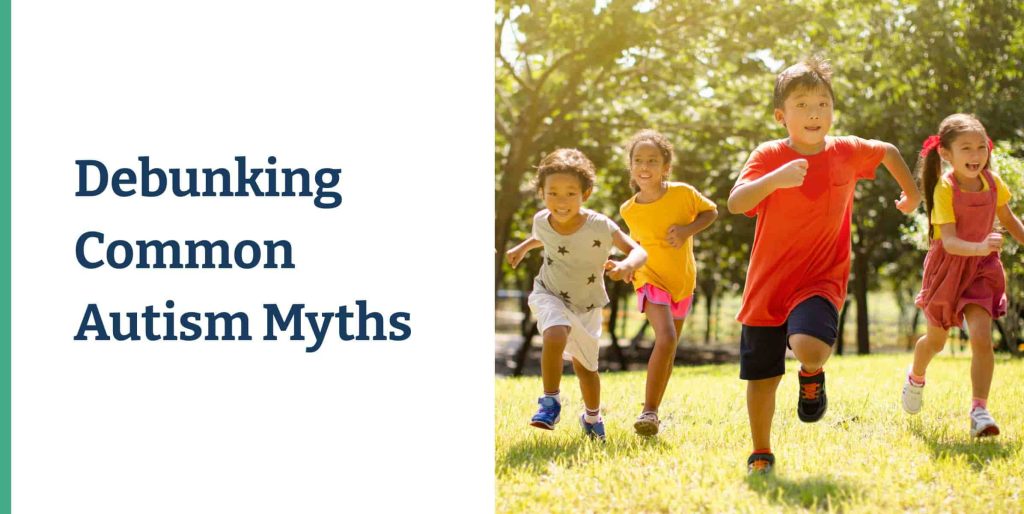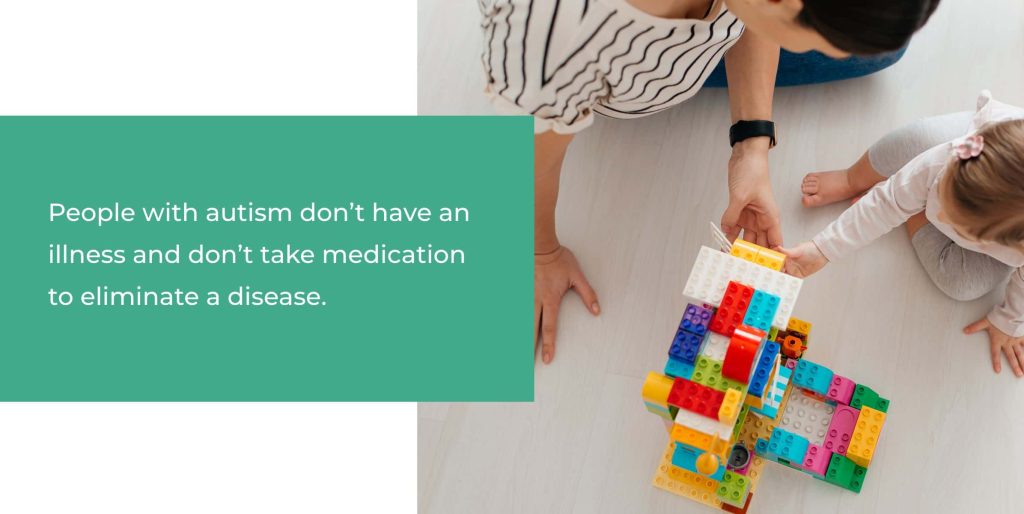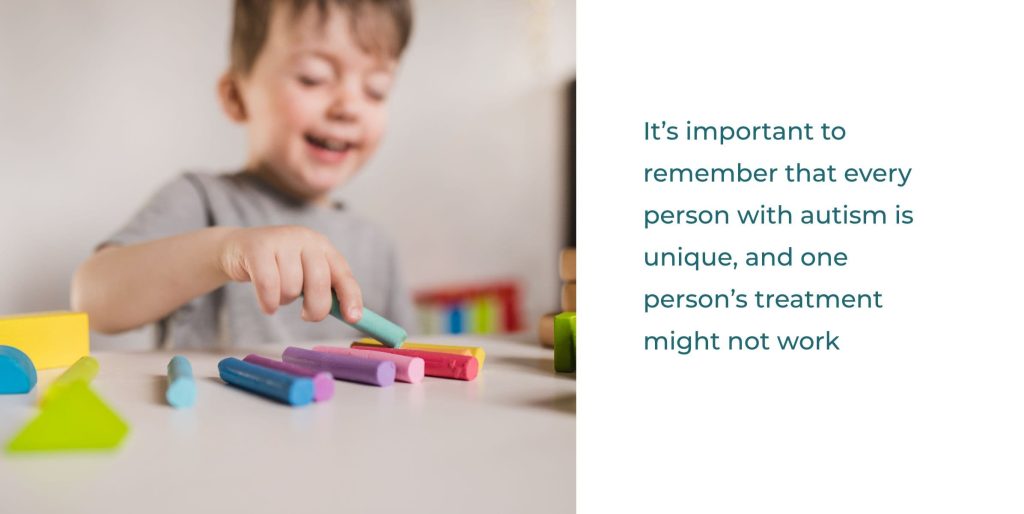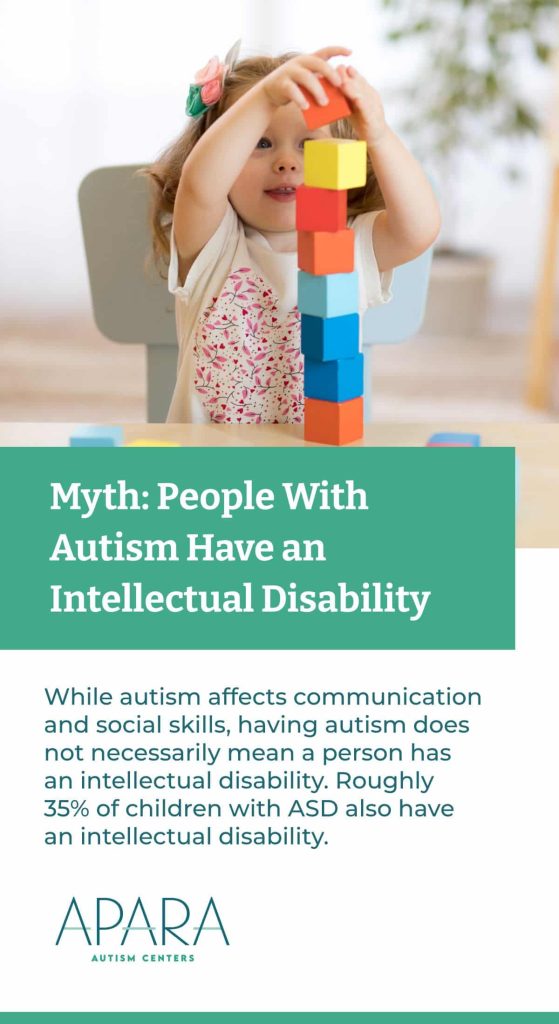Through extensive research and investigation, we now know much more about autism spectrum disorder (ASD). Through programs like the Center for Disease Control’s Autism and Developmental Disabilities Monitoring Network (ADDM), our understanding of ASD and other developmental disabilities is constantly improving, expanding our knowledge to better help children with ASD and related conditions.
While there have been many breakthroughs in autism research, the ASD community still deals with misconceptions about autism. Around 1 in 44 children in the U.S. has been identified with ASD — working to build a better understanding of ASD for these children can help them get the assistance and support they need for successful lives. Here are some common autism myths and the truth behind them.
Myth: Vaccines Cause Autism
The vaccine claim is a well-debunked autism myth. The myth claims giving children vaccines causes them to develop ASD. Since vaccines are first given in early childhood, when the more noticeable signs of ASD emerge, some parents think the vaccines cause ASD to develop. The idea that vaccines cause autism took off in the late nineties due to a poorly performed study, and some people still believe it today. The popularity of this myth has led to many unvaccinated children and a new rise in vaccine-preventable diseases.
The Truth:
There is no evidence of vaccines causing autism. After many studies and reviews — dating back as early as 2014 — experts have found no link between autism and vaccines. Aside from the now-retracted nineties study that initially claimed to have found a link, no other research has been able to recreate the results that prove vaccines lead to ASD in children. Vaccines are thoroughly researched and tested before children ever receive them, and scientists now believe genetics influences the likelihood of developing ASD.
Myth: Autism Is a Disease
Discussion of autism as a disease is one of the ways autism is misunderstood. Autism is not an illness, and it cannot be cured with medicine.
The Truth:
Autism is a neurodevelopmental disorder that can affect how people behave, communicate, learn and socially interact. People with ASD can still live independent and healthy lives and are not sick with a disease. Professional assistance helps provide the building blocks for social and communication skills to people with autism — it does not provide them with a cure.
People with autism don’t have an illness and don’t take medication to eliminate a disease. They may take medication to help with health issues or related symptoms like depression, anxiety, seizures and focus problems, but this is a treatment and not a cure. Using medication to minimize symptoms of ASD can help people focus on communication and learning skills more easily.
Myth: People With Autism Don’t Have Emotions
This instance of autism being misunderstood probably comes from the different ways people with ASD express emotion. One of the symptoms of ASD is difficulties with social interaction and communication. People with autism don’t always appear to react emotionally the same way as people without autism, leading to the idea that they don’t have emotions.
The Truth:
While autism can affect someone’s social and communication skills, it does not influence their ability to feel emotions. People with ASD experience the same range of emotions as people without ASD. People with autism may have facial expressions that seem more intense or may not match up with their emotions, but they still feel emotions exactly as people without autism do.
People with ASD might have trouble interpreting social cues, facial expressions and body language, impacting how they socialize and communicate with others. This difficulty in interpreting social interactions can make it more difficult for people with ASD to communicate with and connect to others. It doesn’t mean they don’t want to form social bonds or have social interactions.
People with autism might also prefer spending time alone, the same as many people without autism. Professional support can assist people with ASD in developing the skills and foundations needed to help them connect with others.
Myth: Autism Is the Same for Everyone
When people hear the word “autism,” they may have one image or definition in their mind. People might view autism as one severe disorder with very little change from person to person, but actually, the opposite is true.
The Truth:
Autism spectrum disorder is a spectrum. This means there’s a wide range of abilities and symptoms among people with ASD. Some people may require little professional assistance and can live relatively independent lives. Other people may have more severe symptoms and need lifelong care and supervision. Because there is a spectrum of signs and symptoms associated with autism, not everyone with ASD will have the same experiences.
It’s important to remember that every person with autism is unique, and one person’s treatment might not work for another. That’s why personalized treatments like ABA therapy can be helpful for children with autism. Evidence-based ABA therapy programs work with individual children and their families to analyze a child’s behaviors and work with them to find techniques that suit their needs and goals.
Myth: Autism Is Becoming More Common
Some people may claim the autism rate increases every year as more is discovered about autism and more people are diagnosed. This myth comes from the fact that the prevalence rate of autism has more than doubled in the last 20 years — from 1 in 150 in 2000 to 1 in 44 in 2018. While this might seem like an increase in the number of people developing ASD, it has more to do with research and awareness.
The Truth:
Experts attribute the increase in autism’s prevalence to education and awareness rather than more people developing autism each year. Research and science around autism have improved a lot compared to the first modern study on autism in the 20th century. We now know more about autism’s symptoms and have designed personalized therapy programs to assist people with autism in developing social and communication skills. For example, we now identify picky eating as a potential sign of autism since sensory sensitivities and repetitive behaviors common in people with ASD often contribute to food selectivity.
Along with a greater understanding of autism, we have also improved public awareness and education around autism. More healthcare practitioners, parents, teachers and caregivers are aware of the signs and symptoms of autism so more children with ASD are getting properly assessed by their communities than before. This makes it look like more people are developing autism when the proportion of people with ASD is actually staying the same — it just wasn’t caught as often before.
Myth: People With Autism Are All Geniuses
Thanks to movies like “Rain Man,” which popularized the idea that people with autism are all savants, many people think every person with ASD is meant to be a genius in one specific area. Savant syndrome is a condition where someone displays exceptional mental skills, often in a particular area of focus. This savant skill could be related to music, art, math or memory.
The Truth:
Not all people with autism are geniuses or savants. While it’s estimated 1 in 10 people with ASD show savant skills, most people with autism don’t display special abilities. Even people with savant syndrome tend only to display far-above-average skills in one specific area. The myth of people with autism all being super-geniuses is just a sensational story. Just like people without ASD, people with ASD have a wide range of mental capabilities and intellectual interests.
The idea that people with autism are all geniuses may also come from symptoms commonly seen with autism. Many people with ASD have a specific, hyper-fixated interest in one topic. This interest may lead to above-average knowledge about a particular topic but can also mean the person has excluded learning about other subjects. Expert knowledge in one area might make it seem like someone with autism is a genius when they just have a specific area of interest they love learning about.
Myth: People With Autism Have an Intellectual Disability
On the other hand, many people also think all people with autism have an intellectual disability. Like the previous myth, there is some truth behind it, but it spreads incorrect information about people with ASD, who have a wide range of intellectual abilities.
The Truth:
While autism affects communication and social skills, having autism does not necessarily mean a person has an intellectual disability. Roughly 35% of children with ASD also have an intellectual disability. However, autism itself is not an intellectual disability. There is a range of high and low IQs among people with autism and having autism is not an indicator or intellectual disability. People with ASD will develop at different rates and display various communication abilities, intelligence and skills, just like people without ASD.
Some people with autism are non-verbal or only speak a little. This may lead people to believe they have an intellectual disability when that is not always the case. People with ASD who can’t communicate verbally don’t have an intellectual disability any more than those who can’t speak. Speech is not an indicator of intellectual disability. There are people with autism with a range of speaking abilities that don’t always affect whether or not they have a disability besides ASD.
Myth: Autism Is a Childhood Condition
It’s common for people to think autism is something children grow out of. Often, we don’t hear as much about adults with autism, which may lead people to believe only children have autism.
The Truth:
Children with ASD don’t grow out of it — autism is a lifelong neurodevelopmental disorder and doesn’t go away or fade as people age. Once diagnosed with ASD, children and adults should receive treatment to help them build the skills necessary for success in life. Many people will need support until they are adults or through their entire lives.
Since autism is a spectrum, the severity and symptoms will change from person to person. Some aspects might develop differently or become more or less intense with age. The exact impact autism has on someone’s life will depend on where they are on the spectrum and the help they receive. While people with ASD will live with it their whole lives, they can still have happy, independent and meaningful experiences just like anyone else.
Myth: Autism Is Caused by Bad Parenting
There was once a belief that autism was caused by inadequate or absent parenting. People assumed neglecting a child somehow caused them to become autistic. While we don’t know the exact cause of autism, we know that bad parenting doesn’t affect whether a child develops ASD.
The Truth:
The cause of autism is still unknown — what we do know is a combination of genetic and environmental factors leads to the development of ASD. Environmental factors — like parent age at conception, maternal health issues or immune disorders, infant prematurity and pre-natal exposure to pollution — might increase the chances of developing ASD when combined with certain genetic factors. Research suggests parenting style has nothing to do with developing autism, and many of the factors that might cause autism already happen during pregnancy.
Myth: Autism Can Be Cured
Some therapies and treatments may claim to cure autism, but these claims are not backed up by science. There are treatments for managing symptoms of autism, but there is no cure for the disorder.
The Truth:
While there is no cure for autism, people with autism can lead full lives with researched-backed therapy and professional assistance. They can develop the skills they need to buy houses, get jobs and succeed in adulthood. Medicine is available to help people with ASD minimize associated conditions like depression, anxiety and attention-deficit/hyperactivity disorder. Using medication to manage these conditions can help people with ASD focus on building important communication and social skills.
Medicine, vitamins and restrictive diets don’t cure autism and shouldn’t be used in place of professional assistance. While many parents claim to have seen improvements after putting their child on a gluten-free, casein-free diet, there isn’t enough research to prove they’re helpful and can lead to nutritional deficiencies in children. You should only use medicine and follow restrictive diets as recommended by your doctor to ensure children remain safe and healthy.
Debunking Autism Myths
Autism is a complex disorder, and we still have much to learn about it. With such a broad spectrum of signs, symptoms and treatments, children must receive professional treatment tailored specifically to their unique needs. At Apara Autism Centers, we use evidence-based ABA therapy to identify patterns in children’s behavior and help them establish positive skills and habits for achieving their fullest potential.
Our expert specialists will work with your child to find the goals and strategies to help them navigate school and adult life. We offer in-home, center-based and telehealth services to provide your child with a flexible, comfortable treatment style. For parents, we also have self-guided courses they can use to help them support their children and learn more about ASD.
Contact us today and request a free consultation to evaluate the best strategies for helping your child build essential skills and behaviors for preschool and beyond.








